STUCK IN EUROPE'S BACKYARD
The door has shut. A handshake with Turkey stemmed the torrent of migrants and refugees that has been running to Europe. However, there are still more than 50 thousand people stranded in Greece, haunted by the possibility of deportation. Further down in this article, someone shall say that closing a border is like squeezing a balloon: the air doesn't vanish, it merely moves elsewhere.
by Catarina Santos, in Greece
Sunday is market day around Eleonas' refugee camp, a few miles aways from the heart of Athens. Wahidulla Qais crosses the gate into the centre of the mess wearing a confident smile. “Have you seen the latest news? I saw it on Deutsche Welle that they're trying to open a new route through Albania, Croatia and Italy, and that the governments of these countries would agree”. The same talk heard a few days before, in Lesbos, from the mouth of Shah, the Pakistani.
Rumours fly quickly, furthermore among thousands of people who are constantly looking for a way out. It has been like this since early March, when Macedonia closed its border with Greece completely and when Slovenia, Croatia and Serbia forbade the entry of irregular migrants and refugees in their territories, putting an end to the “Balcan route”.
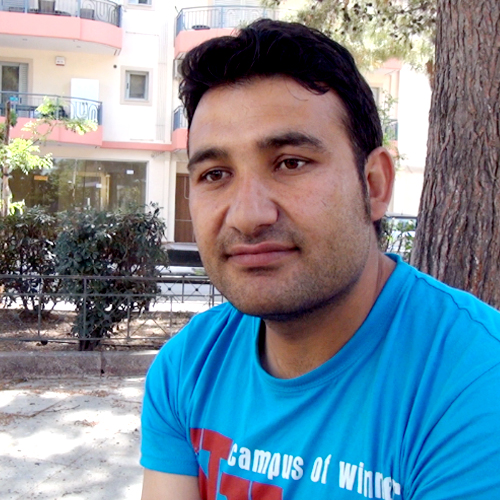
- 33 years old, contractor
- Escaped from Afghanistan with his family.
- In Greece since 7 March 2016
- Has not yet applied for asylum
This 33 year-old contractor, who spends his days reading websites like Deutsche Welle, Euronews or BBC, was cautious enough not to spread the news across Eleonas' camp, where he lives with his family. “They're all under pressure. Until it becomes official I won't tell them. It may not be confirmed and then they'll accuse me of having disappointed them”.
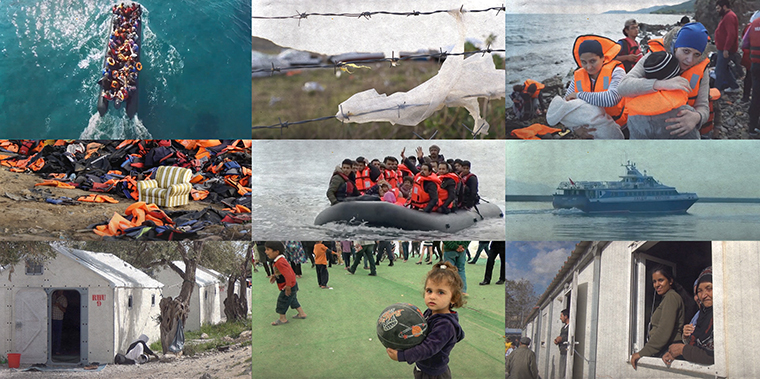
Greece, the entrance door for over 850 thousand migrants and refugees in 2015, is now, for many of them, a dead end street. Those who arrive have three options: request asylum, apply to join the family reunification programme or ask to be relocated in another member state. But for someone like Wahidulla, there is only the first option. The r system is unavailable to Aghan citizens.
While he walks along pavements filled with flower boxes, gewgaws and towels for Sunday's market, Wahidulla forces himself to believe that he will eventually stumble into an alternative.
LEGAL ACCESS WAYS TO EUROPEAN COUNTRIES
In 2015, the European Union made the commitment of relocating, until 2017, 160 thousand people in clear need of international protection, who are in Italy, Greece and Hungary.
This mechanism is only available to Syrian, Iraqui and Eritrean citizens, that is, applicants with high chance of having their asylum request accepted (more than 75% of the EU-wide average recognition rate).
Migrants can't choose the country they wish to go to. Member states receive 6 thousand Euros for each person they take in. The rhythm of these transfers has been extremely slow.
Out of the 160 thousand predicted, only 1,500 people were relocated until the 18th May. The biggest obstacle pointed out by the European Commission is the member states' lack of political will, not offering enough vacancies.
Greek and Italian services' difficulties to register and process requests are also related with the delays.
This mechanism predicts the transfer of 20 thousand people from the countries countries that are most affected by the refugee crisis. Until the 12th April 2016, approximately 6,300 people were resettled in 16 European countries.
Most of these refugees are Syrian, coming from Jordan, Lebanon or Turkey.
European legislation says that anyone that already has refugee status can bring his or her close relatives. According to the European Council for Refugees and Exiles, the application procedures are complex, eligibility criteria are tight and documentation costs are high.
For example, children over 18 are not eligible, even if they depend on their parents. Neither are siblings. Each member state may widen the scope of the nuclear family, but that is optional.

If there aren't any jobs for the Greek people, how can I expect to get one? What kind of future will I be able to give my children here?”
Wahidulla Qais, Afghan
Despite all that, he cannot imagine a future there, in a country that has been devastated by an economic and financial crisis. There is a huge, permanent question mark on his face. “If there aren't any jobs for the Greek people, how can I expect to get one? What kind of future will I be able to give my children here?”
The 30-day permit to stay has expired and Wahidulla doesn't know what to do. If there's no other way, he admits the possibility of requesting asylum to avoid deportation. However, that may well be the very next headache.
THOUSANDS WAITING TO REQUEST ASYLUM ON SKYPE
For many migrants and refugees, both in official and improvised camps, the only way to contact the Greek asylum services is through a Skype call. It was the solution found by the country to deal with the thousands of requests and the lack of techinal means in the camps.
There is only a few hours per week available for the purpose, depending on the spoken language and the type of request. It is necessary to make sure that, on the other side, there will be a translator to suit every case. The result is thousands of people queuing and many complaints of unattended calls, week after week.

There are thousands of people, it’s a gigantic logistics operation. There is a lot of pressure on Greek immigration services”
Jean-Pierre Schembri, European Asylum Support Office's spokesman
THE AGREEMENT EU-TURKEY
The declaration signed between EU and Ankara stipulates that, from the 20th March, all migrants that arrive on the Greek islands and don't request asylum or whose requests are denied are returned to Turkey. A “temporary and extraordinary” measure, says the European Commission, conceived to “put an end to human suffering”, showing that “there is no point in following the path offered by smugglers”.
Main points of the deal:
- “One for one” mechanism: for every Syrian citizen deported to Turkey, another Syrian citizen currently in Turkey is resettled to a European country, EU commits to receive up to 72 thousand Syrians.
- Greece and Turkey are responsible for the application of the agreement. The EU provides human resources, logistics and financing.
- Turkey is responsible for avoiding the opening of new migratory routes.
- The EU gives 6 million Euros in financial aid to Turkey, for Syrian refugees.
- Negotiations towards the future integration of Turkey in the EU will be reopened.
- The obligation of Turkish citizens to have a visa in order to enter the Schengen area (this point gave origin to the first disagreement; Turkey doesn't accept some of the conditions presented by Brussels, like the reform of the current Turkish anti-terrorism laws).
The situation repeats itself all over Greece, mostly on the mainland, and is reported with concern by various non-governmental organizations (NGOs). A group of independent volunteers in the improvised camp of Idomeni, of which Helena Areal, from Portugal, is a member, helped a Syrian woman to create a petition to get some attention on the issue.
When our paths crossed with European Asylum Support Office's spokesman (EASO) in Lesbos, these complaints didn't surprise him. “We're aware of the difficulties you're referring to, we're deeply concerned, we have been discussing the matter with the Greek immigration services and we're looking for solutions”, Jean-Pierre Schembri assured us, in mid April.
Stressing that there are “thousands of people” requesting asylum, which implicates a “gigantic logistics operation” and “a lot of pressure on Greek services”, Shembri said he believes that the responsiveness would improve with the predicted arrival of more technicians in Greece over the following weeks.
On the 19th March, EASO and Frontex (the European agency that controls borders) had appealed to the collaboration of member states to reinforce the technical staff in several areas, but the supply is still very narrow considering the needs. For instance, out of the 1,500 escort officers requested, 739 were promised by the member states, but only 271 were in Greece by the 3rd May. On the same date, out of the 400 interpreters requested, only 63 had been effectively sent.
During a 10-minute conversation, the spokesman never stopped stressing that “the final word belongs to the Greek authorities” and that EASO was there for support only. If the European Union (EU) manages to implement the common European asylum system it suggested in early May, Shembri's answers must be different in the future. The plan is that the office he belongs to becomes a true European agency for asylum – a lot more than the counselling part it currently plays.
THE DEAL THAT BROUGHT OVER THE GHOST OF DEPORTATION
The effective date of the agreement between EU and Turkey, on the 20th March, narrowed down the alternatives: all those who didn't request asylum in Greece or whose applications are refused will be deported. This decision gave origin to a race to Greek immigration services. 3,462 people arrived in April and almost all of them requested international protection.

Imagine: I spent my four thousand euros to get here, I walked through mountains, I crossed the sea; I arrive and say 'it was just a joke, now you go back'. What?"
Shah, of Pakistani Balochistan
There are four registration centres (the so-called “hotspots”) in Greece, located on the islands of Lesbos, Chios, Samos and Leros. After the 20th March, these centres were turned into detention camps. The migrants who arrived after that date are under arrest, while they wait for their situation to be clarified. Only the most vulnerable cases are transferred to open camps.
Moria camp, on the island of Lesbos, is one of those places surrounded by barbed wire, where there are complaints for poor conditions – food, hygiene and, most of all, information.
An investigation by Amnesty International, conducted in early April in Lesbos and Chios detention centres, concluded that many migrants are “detained in appalling conditions” as a consequence of the “rush to implement the agreement” between EU and Turkey and that they didn't have enough knowledge of their legal options.
Journalists aren't welcome in the area and we could only conduct the interviews outside the walls, strongly watched over by Greek police officers and soldiers. It was then that we heard EASO's spokesman guarantee that all migrants were informed of the available options. Several organizations that provide support in the camps, like Save The Children and Doctors of the World, have testified the opposite.
Shah

- 23 years old, student
- Escaped from Pakistani Balochistan
- In Greece since November 2016
- Started the asylum application process in April 2016
Coming from Pakistani Balochistan, he speaks seven languages and was extremely helpful to the police and the NGOs that operate there. But that time is over. A few days before, he had seen 200 people “screaming and crying like mad” by the camp's gate, “because they knew that, at any moment, they could be deported”. This situation aggravates Shah.
Shah took a while to hand in his own asylum request, but when he did, he had the support of Amnesty International and Better Days for Moria – one of the organizations that he worked for – paid for his lawyer. A privilege very few have access to.
“The law determines that all legal rights are explained to them by the authorities. If they wish to be legally supported by lawyers, they are entitled to it and may choose to do so. But they have to pay and, for now, there is no legal support here in the camp [Moria]”, clarifies Nikolaos Choriatellis, the lawyer who took care of Shah's case.
Choriatellis advocates that a facilitated access to lawyers could help provide “official and non-official evidence” to better found the asylum requests. “These people get off a boat and have almost nothing with them”, he reminds us.
THE CLOSED DOOR
We turn our backs on Moria and head west along a road with many olive trees and scattered establishments. A petrol station here, a garage there. Half a dozen curves later and we arrive on the road that connects Kalloni – the sardine capital – to Mytilene – the capital of the island.
We can't see it from the road, but behind the walls of Silver Bay Hotel, 200 migrants have been accomodated. Few signs show the atypical occupation of the space. The swimming pool has been covered with green canvas and there are clothes hanging on a porch. Some women in “hijabs” walk with their children by the playground.
Ahmad Alzaher,
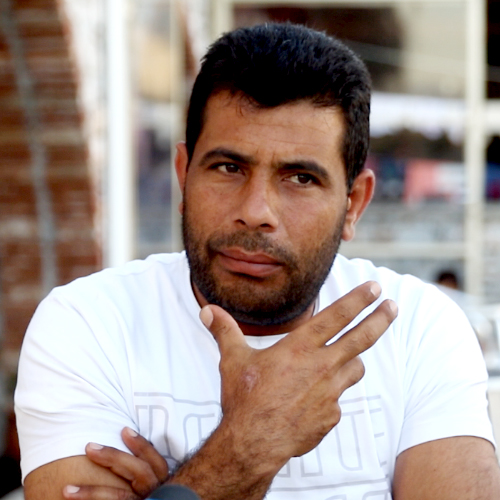
- Contractor
- Escaped from Syria with his family
- In Greece since March 3 2016
- Applied for the replacement program
Since November, the Silver Bay has been fully occupied by Greek Caritas, taking in the most vulnerable cases. Conditions couldn't be further from those denounced at Moria's camp.
The institution provides shelter, food, social care and legal counselling. The Refugee Support Platform (RSP) has Portuguese doctors and psychologists giving support in the camp. “It's a project inspired by the words of Pope Francis: to open our homes to the most vulnerable, the poor. That is what we do here.”, says Maristella Tsamatropoulou, from Caritas' communication office.
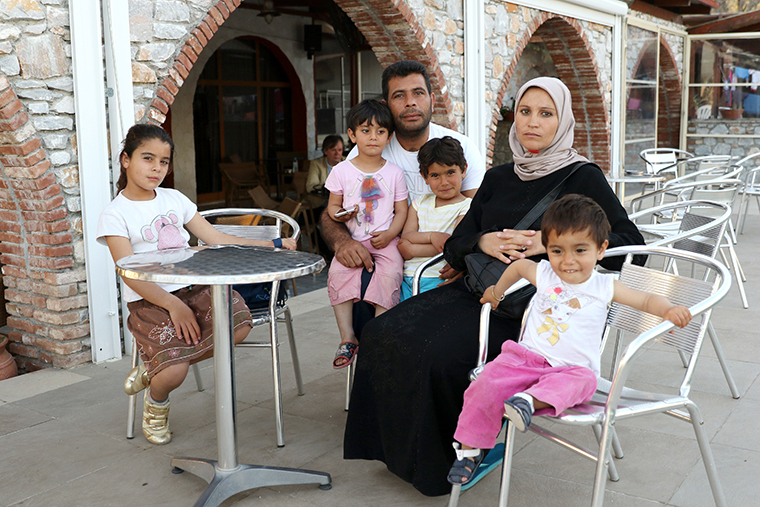
The Alzaher family comes from Aleppo, one of the Syrian cities most devastated by war, and awaits an answer to the relocation request. In just a few weeks of staying in the hotel, the oldest daughter has started to learn English and Greek. “They are very helpful and kind people. We have been able to understand each other, despite the different languages and cultures”, Ahmad says.

I took my family seven times into the ocean and felt like a criminal.”
Ahmad Alzaher, Syrian
While he talks, his wife stands by his side with a closed face and permanently nervous eyes. Ahmad goes on talking slowly, yet there are glimpses of bitterness in his voice.
They spent three months in Turkey, trying to get to Greece. In two of seven attempts, the boat shipwrecked and they were saved by the coast guard. “I took them seven times into the ocean and felt like a criminal. I wasn't fair, but there was no other option”.
After having escaped death in Syria and almost meeting it in the Aegean Sea, not being able to move on was a very violent last drop. “When we arrived here and the borders were closed, everything shut in our face, we felt lost. We are very depressed.”
A “COSMETIC OPERATION”
Had they taken one further month to escape from Syria, the Alzaher family would probably not have made the crossing. One of the consequences of the EU-Turkey agreement was a closer monitoring by Turkish authorities, who prevent boats from leaving their harbours towards Greece. The result wasn't imediate, but figures by the end of April already show a sudden decrease in arrivals.
In seven months on Lesbos, a Portuguese Maritime Police team saved nearly three thousand people, but there are less and less boats detected by the radars of the coast watch car they took to Molivos, in the North of the island.
Pictures of beaches covered in orange life vests and abandoned boats have ceased. The remains of the drama that devastated Lesbos over the past year have meanwhile been concentrated at the top of a mountain. It is a huge symbolic graveyard, with “life-saving” equipment of all sorts – many of them fake or inappropriate, bought from dealers as though they were genuine.
In Lesbos, the refugee crisis is less and less an open wound. Besides the camps, there are few signs left. It is the result of what volunteer Mariana Barbosa calls “a kind of cosmetic operation on the island”.
“It's more difficult to touch people's hearts, to make them realise what's really going on, because they don't see the rubber boats carrying thousands of people. But the situation is still very dramatic”, says this Universidade Católica lecturer, currently working for PAR (Refugee Support Platform), on Lesbos.

TO STANCH A RIVER
The sun burns hot halfway through the morning and Palestine's
Yousef Hammad,
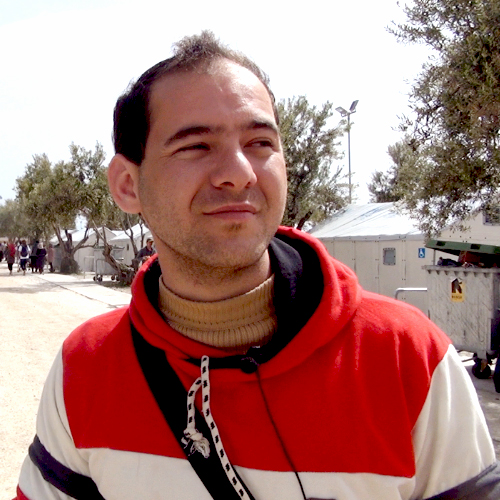
- 26 years old, journalist
- Escaped from Palestine
- In Greece since 26 March 2016
- Asked for asylum
He has absolutely nothing to do and passes the time watching people going by. He offers to guide us on a tour to Kara Tepe's camp, where only the most vulnerable cases are. Like his, who brought several scars from Gaza, resulting from batterings. Yousef is a journalist and his reports on life conditions of the population in the Hamas-controlled territory did not please the regime.
Between a “kalimera” and a “as-salam alaykom”, the Palestinian greets dozens of people on a 100 metre walk. Kara Tepe shelters around 900 people. Moria, where he spent five days, heaps up almost four thousand people, when its maximum capacity should be 2,500. Among them, there many dozens of unattended children.
“There are at least 2,200 unattended children in Greece, but there are many others who haven't even been registered and are missed by the radars, with no protection at all”, stresses Sacha Myers, from Save The Children organization, regretting that there are “only 440 vacancies in shelters for children” made available by Greek authorities.
Yousef requested asylum in Greece because he arrived after the 20th March and feared deportation. However, he doesn't conceal that his plan is to move on. He says there are ways to do it, even with the borders closed, in spite of it being “very expensive and dangerous”.
In Pireu's harbour, in Athens, 450 kilometers from there, we met someone who whispered to us the possibility of buying a fake passaport. With confusing and unsatisfactory official procedures, all alternative solutions are taken into account.

The situation here is very bad. There are many sick people, because the food is bad, unclean. There's diarrhea, children have infections. Everything's missing”
Fuad, Syrian
The improvised camp spreads all over the main Greek port. The busiest season as far as tourism is concerned is about to begin and the authorities try hard to convince the two thousand people who have camped there to move into the official reception centres.
In one of the harbour's covered terminals, there are hundreds of people spread all over the floor, among mountains of duvets and bags of clothes. Fuad is one of the few who speak English and has been playing translator since he arrived. He's 28 and ran from Syria four months ago, alone. “The situation here is very bad. There are many sick people, because the food is bad, unclean. There's diarrhea, children have infections. Everything's missing”.
Despite that, he's unsure whether to accept the proposition of moving to other camps. “First they said they were very good, with hot water, internet for Skype calls” - for many, the only way to speak to immigration services. But some of those who left ended up coming back and Fuad became suspicious of official information. “A bus left here with 50 people and came back with 45, because the situation there was worse than here”.
Fuad doesn't even want to hear about the chance of going back to Syria. “I paid a lot of money to come here. I have nothing left”. Meanwhile he's realised that the family reunification programme doesn't allow him to join his two brothers in Germany. All he has left is the relocation scheme. If he can make the call. “I don't know what's going to happen. I asked and they said I should register on Skype, but there are thousands of people waiting and there is just one hour available every three days. It is a very big problem.”
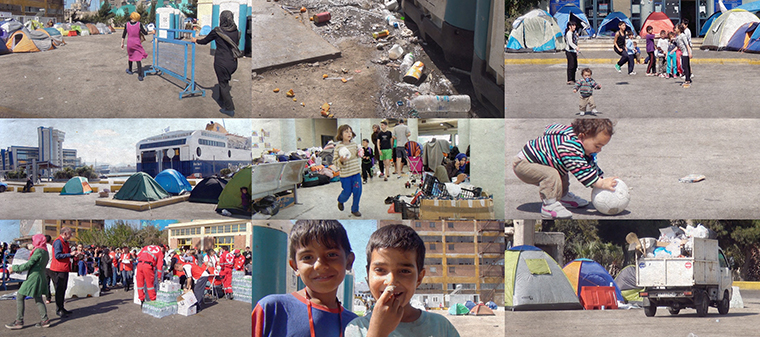
CLOSING A BORDER IS LIKE “SQUEEZING A BALLOON”
In March, Frontex's spokesperson, Izabella Cooper, used a simple image to explain how migratory flows have worked over the last couple of years: “To deal with trafficking networks is like squeezing a balloon”. The air doesn't vanish. One presses a point and it expands elsewhere.
During a video conference with Portuguese journalists, at the European Commission's representation in Lisbon, Frontex's spokesperson sustained that “smugglers will always look for opportunities to continue doing business”.
In a “global European perspective”, she said, “closing a border isn't enough. What one must do is deal with the origin of problems. While there is a war in Syria, an unstable situation in Afghanistan, in Iraq, South Sudan, there will be migrants and refugees arriving and, therefore, there will be smugglers”.
Over 180 thousand migrants and refugees entered Europe since the beginning of the year. More than a million had arrived in 2015. Most had chosen the Greek route, less dangerous than the one that took 170 thousand to cross the Mediterranean to Italy, in 2014.
Before such a crisis, with a tendency to grow, the deal with Turkey threatens to be just another squeeze of the balloon.
© Renascença| Maio 2016
Report: Catarina Santos (text and video)
Post-production and motion graphics: Rodrigo Machado
Editors: Maria João Cunha, Pedro Rios
Web development: Tânia Barreira
Web Design: Luís Alves
Stock footage: Reuters, European Union, United Nations,
Portuguese Maritime Police
Music: Satellite Ensemble, Ars Sonor, Kai Engel
© Renascença 2016
Website optimized for Internet Explorer 9.0 or higher,
Google Chrome e Firefox




